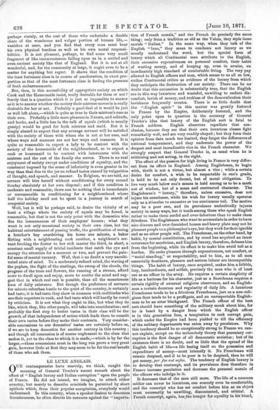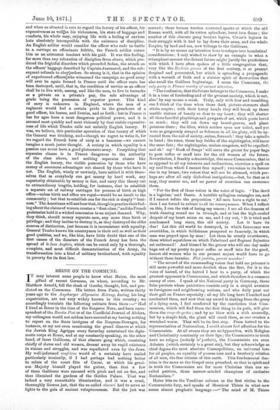LE LUXE ANGLALS.
OUR contemporaries have scarcely, we think, caught the meaning of General Trochu's recent remark about the effect of "English luxury and Italian corruption" upon the people of France. He did not intend, we imagine, to attack either country, but merely to describe mischiefs he perceived by short epithets which, from their popular acceptation, everybody would understand. In this country, when a speaker desires to denounce licentiousness, he often directs his censures against the "importa-
tion of French morals," and the French do precisely the same thing; only from a tradition as old as the Valois, they style loose morals "Italian." In the same way, when they talk of the English "luxe," they mean to condemn not luxury as we usually understand the word, but the special form of luxury which all Continental men attribute to the English, their excessive expensiveness on personal comfort, their habit of wasting money, and of keeping up, even in armies, an inordinately high standard of comfortable living. The very pay allowed to English officers and men, which seems to us all so low, strikes Continental critics as evidence of the luxury from which they anticipate the destruction of our society. There can be no doubt that this accusation is substantially true, that the English are in this way luxurious and wasteful, unwilling to endure dis- comfort, lavish of money, and reckless of the demoralization their lavishness frequently creates. There is as little doubt that the ".English spirit" in this matter was greatly fostered in France by the Empire, deliberately fostered, and the only point open to question is the accuracy of General Trochu's idea that luxury of the English sort is fatal to French soldiers. English observers repudiate that con- clusion, because they see that their own luxurious classes fight remarkably well, and are very readily obeyed ; but they form their opinion from data much too limited, they forget the differences of national temperament, and they underrate the power of the deepest and most ineradicable vice in the French character. We strongly suspect that General Trochu is, as usual when he is criticizing and not acting, in the right.
The effect of the passion for high living in France is very differ- ent from its effect in England. Among Englishmen, to begin with, thrift is not a virtue, but almost a vice ; while a certain desire for comfort, a wish to be respectable in one's grade, is held to be not only decent, but of moral obligation. To live very much below one's means is held among us to be a mark not of wisdom, but of a mean and contracted character. The Englishman's "luxury," therefore, unless excessive, does not injure his conscience, while his wish for luxury usually operates only as a stimulus to excessive or too continuous toil. The motive may be a poor one, and its prevalence undoubtedly injures society in many ways, but it tends among those who speak English rather to make them sordid and over-laborious than to make them frivolous. The Englishmen who want to accumulate in order to have nice dinners and over-furnished houses and heavy plate may not be pleasant people to a philosopher's eye, but they work for their ignoble end as no other people will. The Frenchman, on the other hand, by habit, by mental constitution, and by creed has acquired an inner reverence for asceticism, and English luxury, therefore, debases him from the beginning, while its effect is to make him avoid toil as a burden. He seeks pleasure through expensiveness, not comfort, or "social standing," or respectability, and to him, as to all men essentially Southern, pleasure and serious labour are incompatible things. The habit of luxury, once acquired, makes him a fribble, lazy, insubordinate, and selfish, precisely the man who is of least use as an officer in the army. He requires a certain simplicity of life as a buttress for his character, just as a Scotchman requires a certain rigidity of external religious observance, and an English- man a certain decorum and regularity of daily life. A luxurious Frenchman tends to be a frivolous Frenchman, just as a non-reli- gious Scot tends to be a profligate, and an unreapectable English- man to be an utter blackguard. The French officer of the best sort should have something of the military monk about him, for he is beset by a danger from which the English officer is in this generation free, a temptation to seek corrupt gain, which under the Empire had been yielded to till the efficiency of the military departments was eaten away by peculators. Why this tendency should be so exceptionally strong in France we can- not explain, except on the melancholy theory that pecuniary cor- ruption is the first danger of all democratic societies ; but of its existence there is no doubt, and as little that the spread of he English habit of life—a life basing itself on the possession and expenditure of money—must intensify it. No Frenchman will remain despised, and if to be poor is to be despised, then he will get money, per fas aut nefas. The tendency of English luxury is to develop that contempt, and its prevalence does therefore in France increase peculation and decrease the personal morale of the officers who indulge in it.
It decreases that of the men still more. The life of a common soldier can never be luxurious, can scarcely even be comfortable, and the conscript who has set comfort before him as an object must necessarily be unwilling, discontented, and critical. A French conscript, again, has the hunger for equality in his blood, and when so situated is sure to regard the luxury of his officer, his expensiveness as well:as his viciousness, his store of baggage and comforts, his whole easy, enjoying life with a feeling of envious hate absolutely incompatible with the existence of discipline. An English soldier would consider the officer who rode to battle in a carriage an effeminate fribble, the French soldier curses him as an aristocrat insolent with his gold. It was this feeling, far more than any relaxation of discipline from above, which pro- duced the frightful disorders which preceded Sedan, the attack on the officers' baggage described by Captain J eannerod, and the sub- sequent refusals to obey:orders. So strong is it, that in the opinion of experienced officeralwho witnessed the campaign no good army will ever be again formed in France until the officer caste has been destroyed, until, that is, the condition of service as an officer shall be to live with, among, and like the men, to live in barracks as a private on a private's pay, the sole advantage of grade being the possession of superior power. This kind of envy is unknown in England, where the men of a regiment would feel a certain pride in the grandeurs of a good officer, his horses, and liveries, and so forth ; but in France it has for ages been a most dangerous political power, and it is aroused most quickly and most viciously by that visible expensive- ness of life which Trochu calls not unfairly English luxury. It was, we believe, this particular operation of that luxury of which the General was thinking, and—though we regret to write it, for we regard the French form of envy as a baseness—we cannot imagine a much juster thought. A society in which equality is a passion can never have a good plutocratic army. Everything that separates classes is in France dangerous to the authority of the class above, and nothing separates classes like the English luxury, the visible possession by those who have money of enormous advantages not shared by those who have it not. The English, wisely or unwisely, have settled it with them- selves that as everybody can get money by hard work, any superiority obtainable by money is fair, and carry this theory out to extraordinary lengths, holding, for instance, that to establish a separate set of railway carriages for persons of birth or high office—unless birth and office are royal—would be an insult to the community ; but that to establish one for the rich is simply" busi- ness." The Americans will not bear that, though in practice their feel- ing about the claims of women creates a "first-class ;" and the French proletariat hold it a wicked concession to an unjust demand. Why, they think, should money separate men, any more than birth or privilege ; and they incline to destroy it, as they destroyed the older sources of distinction, just because it is inconsistent with equality. General Troche knows his countrymen in their evil as well as their good qualities, and we, like him, have little doubt that one of the first causes of the disasters of the French Army has been the spread of le luxe Anglais, which can be cured only by a thorough, complete, and most difficult democratization of the Army, its transformation into a kind of military brotherhood, with equality in poverty for its first law.



































 Previous page
Previous page